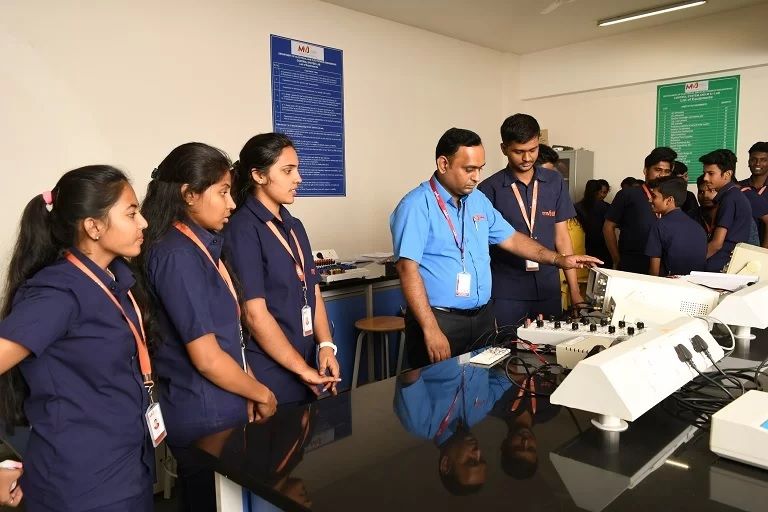Course Structure
The Curriculum of the Electronics and Communication Engineering course has been framed, based on NEP guidelines, with a strong focus on Multidisciplinary education. All the recommendations of NEP have been carefully considered while framing the syllabus. Suggestions of experts from Industry and Academia have been given due weightage, and incorporated into the Curriculum. The flexibility for students to select courses of their choice – one of the important recommendations of NEP – has been implemented through a Choice Based Credit system. Students can get an Honors Degree, by earning extra 18 credits, as per the guidelines of the University.
The Electronics and Communication Engineering course equips students with knowledge in the fields of Signal and Image Processing, Analogue and Digital Electronics, VLSI, Robotics, Wireless and Fibre Optical Communication, Embedded System Design and Application. The 4-year course consists of four Basic Science courses, six Integrated Professional Core courses, five Professional Core courses, three Internships, five Humanity & Social Science and Management courses, six Ability Enhancement courses, two Universal Human Value courses, three Open Electives, four Professional Electives, Industrial Training and ample Project Work.
In the First year, students will learn Basic Science, Engineering Science, Humanity and Social Science. In the Second year, the curriculum has been framed to provide a strong foundation in Electronics. In the Pre-final and Final years, the curriculum gives students the flexibility to choose courses in the area of their interest, in the field of Electronics and Communication. It gives them an opportunity to choose a course in any Multidisciplinary domain.
Industrial Internship training is a part of the Curriculum, where students have to work in an Industry relating to their area of interest, for a minimum period of 4 weeks. This gives them exposure to technology in practice, and makes them comfortable in an industrial environment.
Technical Seminars that are included in the Curriculum help students to experience self-learning, and develop communication and interpersonal skills. The Clubs of the Department train the students on industrial requirements such as technical projects, and offer them the opportunity to participate in competitions. Research activities, very much the core strength of the department, propel students towards innovations and lifelong learning.
With all these courses and activities built into the Curriculum, the department ensures the creation of holistic Electronics and Communication Engineers who possess Multidisciplinary skillsets, which is what is envisaged by NEP.
